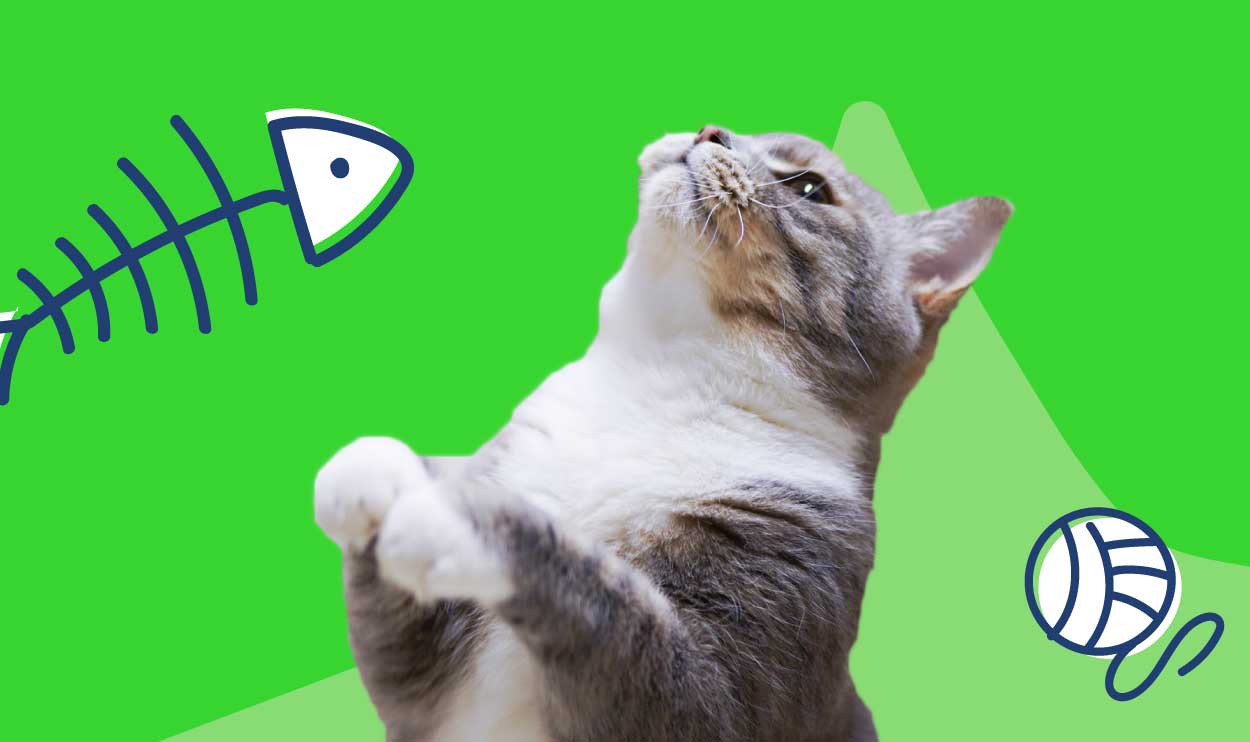How to deal with
your cat's skin problems
How to deal with
your cat's skin problem


Notice small scabs or inflammation? That’s a sign that something might be up.
Itching and scratching?
Your cat might normally be a picture of poise and composure. But if you notice they’re itching, scratching or grooming themselves more than usual, it may be a sign that something’s going on.
There are a few different reasons why cats might struggle with their skin. One of the most common is an allergic reaction (sometimes called ‘allergic dermatitis’). Cats can be intolerant to certain things in their environment, and you should act quickly to make sure they’re feeling back to normal as soon as possible.
Symptoms of cat skin allergies
Cats grooming themselves is nothing new so it can sometimes be a bit difficult to work out whether they’re suffering from an allergic reaction, or if they’re simply preparing themselves for a night out on the town.
The biggest giveaway for cat skin allergies is (no surprises here), their skin. If you notice small scabs or any other signs of inflammation, it’s a sign that something’s up. You might also notice patches of missing hair and runny eyes. In severe cases, the allergy might affect more than the skin, causing sneezing, wheezing, snoring, and sometimes vomiting.
If you notice any of these symptoms, your first port of call should always be to take your pet to the vet. Got a TrustedPals Wellness Plan as part of your cat insurance? The check-up’s covered, so there’s no need to wait.
What’s causing the problem?
Part of the problem with cat skin allergies is that it can be quite difficult to work out exactly what’s causing the problem. That’s because your pet comes into contact with all sorts of different things while they’re at home or out and about.
There are three main categories that allergic dermatitis in cats falls into. These are fleas, dietary issues, or environmental allergens. Your vet will be able to help you work out what the problem is by eliminating the possible causes - one by one.
Eliminating the causes of cat skin allergies
Your vet might start by making sure your cat doesn’t have fleas, using an anti-flea treatment to see if the skin reaction stops. If it doesn’t, your vet may recommend an ‘exclusion diet’, which switches up what they eat to work out if that’s the issue.
There are a few different things in your cat’s food that might be causing your pet problems, including beef, fish, chicken and dairy. These types of allergies aren’t very common, but there are special types of hypoallergenic cat food available, which you can switch over to if a certain ingredient is the culprit.
If fleas and diet aren’t the issue, then it’s probably something in your cat’s environment that’s causing the problem, which might mean they need special prescription medication, that may be covered under your pet insurance program.
Managing allergic dermatitis in cats
While your vet will be able to give you medicine to manage your cat’s environmental allergies, the best medicine is prevention. This can be tricky if you’re still not sure what’s irritating your pet’s skin, but there are a few common allergens that you can try to eliminate.
These include:
Pollen from trees, grass and other plants
Certain perfumes
Chemicals in cleaning products
Cigarette smoke
Certain fabrics and materials (like rubber or plastic)
Wherever possible, you should try to limit your cat’s exposure to these. Although it might be a bit tricky to stop them from going outside if pollen is the problem!
Aside from limiting exposure to things like perfume and smoke, you should also make sure to remove any dust or other potential irritations. Just like you would if anyone else in the home had allergies.
This might not fix the problem if the condition is being caused by something outside of your control. But it always helps to eliminate as many of the possibilities as you can, and as early as possible.
It might not be allergies
Cat skin problems are often caused by allergies, but fleas, dietary issues and other irritations aren’t always the problem.
Sometimes, your cat might have a more serious condition. Other cat skin problems can include things like bacterial or fungal infections, insect bites, and even skin cancer.
Along with severe allergies, there are some other skin conditions in cats that cause hair loss. These include ringworm and even nervous disorders like over-grooming (yup, even for cats there’s such a thing as too much self-love).
Get insured, and get to the vet
As you can tell, there are all sorts of potential causes for itching or scratching. Some are simple and easy to manage, while others can be a lot more serious.
You won’t know what the issue is until you get to the vet, so book an appointment as soon as you notice any symptoms. That way, you’ll be able to find out what’s wrong, and get the right treatment underway.
When you’re looking for the best cat insurance company to look after your pet, it’s important to find a plan that covers both prescriptions and exams. That way, you’ll be able to get your pet looked at and treated without having to worry about the bills.
At TrustedPals, we’ll cover the lot. Your cat’s health and happiness is our number one concern.
If you want to find out more about what our cat health insurance plan will cover or how the claims process works for allergies, all you need to do is get in touch!
Share this
You might be interested in
Itching and scratching?
Your cat might normally be a picture of poise and composure. But if you notice they’re itching, scratching or grooming themselves more than usual, it may be a sign that something’s going on.
There are a few different reasons why cats might struggle with their skin. One of the most common is an allergic reaction (sometimes called ‘allergic dermatitis’). Cats can be intolerant to certain things in their environment, and you should act quickly to make sure they’re feeling back to normal as soon as possible.
Notice small scabs or inflammation? That’s a sign that something might be up.
Symptoms of cat skin allergies
Cats grooming themselves is nothing new so it can sometimes be a bit difficult to work out whether they’re suffering from an allergic reaction, or if they’re simply preparing themselves for a night out on the town.
The biggest giveaway for cat skin allergies is (no surprises here), their skin. If you notice small scabs or any other signs of inflammation, it’s a sign that something’s up. You might also notice patches of missing hair and runny eyes. In severe cases, the allergy might affect more than the skin, causing sneezing, wheezing, snoring, and sometimes vomiting.
If you notice any of these symptoms, your first port of call should always be to take your pet to the vet. Got a TrustedPals Wellness Plan as part of your cat insurance? The check-up’s covered, so there’s no need to wait.
What’s causing the problem?
Part of the problem with cat skin allergies is that it can be quite difficult to work out exactly what’s causing the problem. That’s because your pet comes into contact with all sorts of different things while they’re at home or out and about.
There are three main categories that allergic dermatitis in cats falls into. These are fleas, dietary issues, or environmental allergens. Your vet will be able to help you work out what the problem is by eliminating the possible causes - one by one.
Eliminating the causes of cat skin allergies
Your vet might start by making sure your cat doesn’t have fleas, using an anti-flea treatment to see if the skin reaction stops. If it doesn’t, your vet may recommend an ‘exclusion diet’, which switches up what they eat to work out if that’s the issue.
There are a few different things in your cat’s food that might be causing your pet problems, including beef, fish, chicken and dairy. These types of allergies aren’t very common, but there are special types of hypoallergenic cat food available, which you can switch over to if a certain ingredient is the culprit.
If fleas and diet aren’t the issue, then it’s probably something in your cat’s environment that’s causing the problem, which might mean they need special prescription medication, that may be covered under your pet insurance program.
Managing allergic dermatitis in cats
While your vet will be able to give you medicine to manage your cat’s environmental allergies, the best medicine is prevention. This can be tricky if you’re still not sure what’s irritating your pet’s skin, but there are a few common allergens that you can try to eliminate.
These include:
Pollen from trees, grass and other plants
Certain perfumes
Chemicals in cleaning products
Cigarette smoke
Certain fabrics and materials (like rubber or plastic)
Wherever possible, you should try to limit your cat’s exposure to these. Although it might be a bit tricky to stop them from going outside if pollen is the problem!
Aside from limiting exposure to things like perfume and smoke, you should also make sure to remove any dust or other potential irritations. Just like you would if anyone else in the home had allergies.
This might not fix the problem if the condition is being caused by something outside of your control. But it always helps to eliminate as many of the possibilities as you can, and as early as possible.
It might not be allergies
Cat skin problems are often caused by allergies, but fleas, dietary issues and other irritations aren’t always the problem.
Sometimes, your cat might have a more serious condition. Other cat skin problems can include things like bacterial or fungal infections, insect bites, and even skin cancer.
Along with severe allergies, there are some other skin conditions in cats that cause hair loss. These include ringworm and even nervous disorders like over-grooming (yup, even for cats there’s such a thing as too much self-love).
Get insured, and get to the vet
As you can tell, there are all sorts of potential causes for itching or scratching. Some are simple and easy to manage, while others can be a lot more serious.
You won’t know what the issue is until you get to the vet, so book an appointment as soon as you notice any symptoms. That way, you’ll be able to find out what’s wrong, and get the right treatment underway.
When you’re looking for the best cat insurance company to look after your pet, it’s important to find a plan that covers both prescriptions and exams. That way, you’ll be able to get your pet looked at and treated without having to worry about the bills.
At TrustedPals, we’ll cover the lot. Your cat’s health and happiness is our number one concern.
If you want to find out more about what our cat health insurance plan will cover or how the claims process works for allergies, all you need to do is get in touch!






